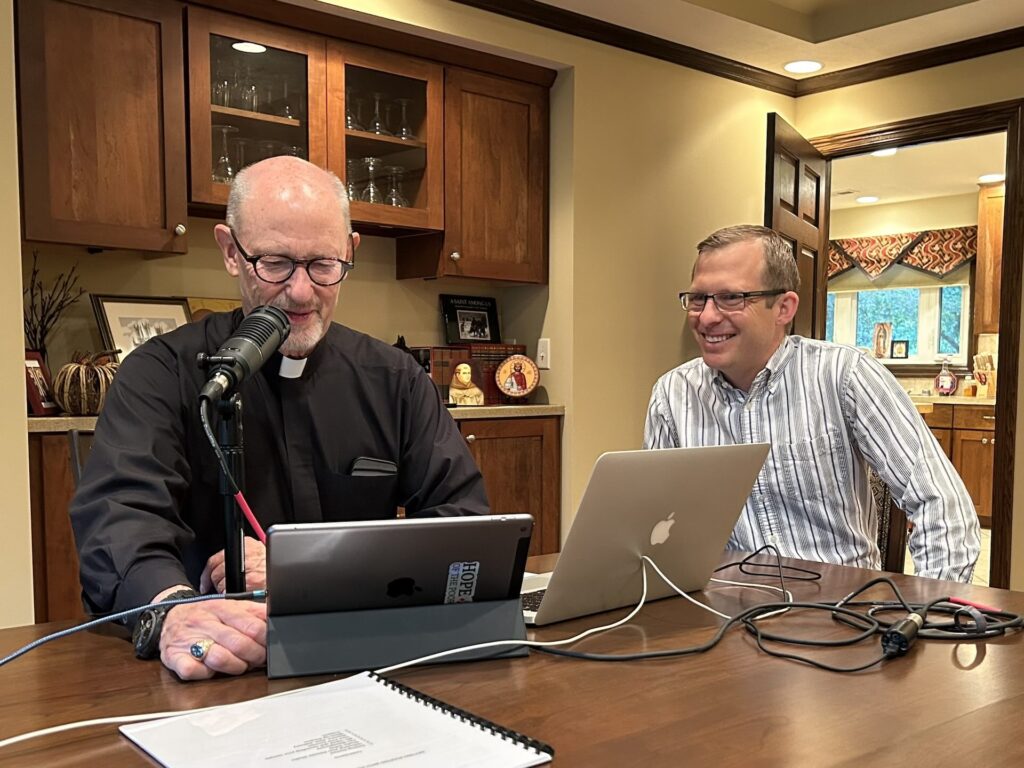Precept 1: You shall attend Mass on Sundays and on holy days of obligation and rest from servile labor.
The first precept is about what we do on Sundays and holy days of obligation.
Early Christians called Sunday the Day of the Lord, and the Fathers of the Church called it the first, the third, and the eighth day.
It is the first day of the week of creation, the third day on which our Lord rose, and, because of what the Resurrection means, it is the eighth day that breaks out of our seven-day cycle of earthly time and introduces us into eternity.
What we do on Sunday reflects—and helps us experience—what we believe.
The first part of the precept is to “attend” the Mass. Perhaps a better word is to “assist” at the Mass since we are not simply to be passive spectators.
Instead, we pray along with it and offer our life to the Father with Christ’s offering of himself.
But the Church’s word here is wise, for when we are down because of sin, suffering, or anxiety, we are often unable to do much in the way of assisting or praying in any active sense.
“Attend” comes ultimately from the old Latin word attendere, meaning literally “to stretch forward” and less literally “to wait for,” “to pay attention,” or “to listen carefully.”
Even when we cannot do much in the way of actively praying the Mass, we can be present at the “source and summit of the Christian life” (Lumen Gentium 11) and listen as Christ prays for us.
When we don’t feel anything, we can take in the words of the Mass (perhaps by following along with those words in a Missal) and stretch ourselves forward, praying that Christ would heal our broken spirit and give us the courage to go to confession and heal our hearts if that is our need.
Even if we cannot actively pray, we can be assured that if we wait on the Lord in the Mass, he will come to us.
One thing that might ease our minds at Mass is to remember the second part of the precept: “rest from servile labor.”
Clearly, there are some professions that require work on Sundays and holy days (fire, emergency, police, medical services).
But the Church does want us to mark out Sundays and holy days as times of rest and worship anticipation of our time in heaven when we will all be engaged wholeheartedly in God’s work, worshiping him and enjoying fellowship with his saints.
In this regard, holy days of obligation are equal in commitment to Sundays here, and canon law reinforces this reality (see Code of Canon Law #1247).
Yes, this means that when a holy day of obligation falls on a Wednesday, for example, we should take the whole day off of work, not just attend Mass in the evening.
This is a great gift.
For the evil one is at work in the world to bind us, but Christ has set us free and his bride, the Church, has established her law to keep us in this great gift of freedom.
Again, when a holy day of obligation falls on a work day, we must take the day off of work.
It’s not a luxury for those who are not exempt—it is the loving law to do so.
Practically speaking, what does resting and worshiping God look like on Sundays and holy days of obligation besides attending Mass and being free from our professional work?
It means avoiding laborious tasks that keep us from extra prayer, leisure, family time, and rest.
For example, mowing the yard and grocery shopping are two things that you can joyfully plan to do before Sundays and holy days of obligation so that abstaining from doing them on these days is not felt as a burden but a freedom.
Another possibility is abstaining from the technology that often keeps us from both prayer and personal interaction with each other.
Rather than being tied to social media, email, or private entertainment, we can spend time with our family and friends and even visit the sick or the old— unmediated by screens— and see God’s face anew.
As you enter into prayer today, talk with the Lord about how this first precept sets you free to be the man for others that you were made to be.




